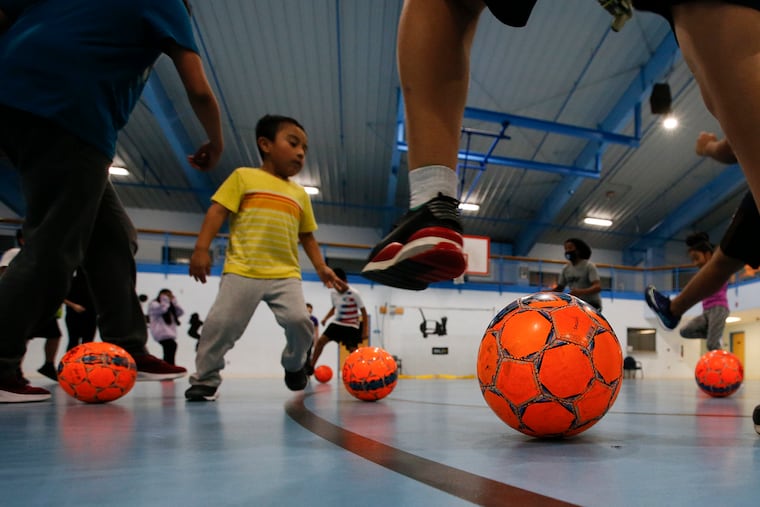Soccer connects kids, cops, and communities in Bridgeton, N.J.
Some immigrants have been afraid to report crimes out of a lack of trust or fear of being deported. Soccer is safely connecting them with the police department.

The Alms Center’s gleaming gymnasium was alive with the squeak of sneakers and the slap of futsal balls against hardwood as coach Leon Brown’s Caribbean-inflected commands cut through the exuberant din.
“Elbows! Knees!”
Coach Marcus Littlefield, who hails from the United Kingdom, picked up the tempo as he and Brown led 16 boys and girls through a “body parts” drill.
“Eyes! Ears! Noses!”
On otherwise quiet Thursday evenings in Bridgeton, a quaint-but-tough-around-the-edges city in Cumberland County, N.J., a faith-based organization and the local Police Athletic League are providing soccer practices with professional coaches like Brown and Littlefield to the community’s Mexican and other Latinx children. The goals include family fun, player development — and a fostering of trust between the city’s large Spanish-speaking immigrant community and the Bridgeton police.
“It opens the door,” said Jon Cummings, who served as a Christian missionary in Mexico and Africa and is executive director of Revive South Jersey (a.k.a. Revive SJ), a ministry-outreach nonprofit that works to meet the physical and spiritual needs of communities. The organization proposed the program and partnered with PAL, which runs basketball and skating programs for city youth. “We want this to be a win for everyone.”
Said Bridgeton PAL director Josh Thompson, a 25-year police veteran: “Some Mexicans in the city have been afraid to report crimes to the police, out of a lack of trust or fear they could get deported. Soccer has connected a lot of people in the Mexican community with the police department, and with other PAL programs."
Established last year after Revive SJ consulted with Bridgeton’s United Advocacy Group, a social-services provider, the soccer program also offers counseling, ESL and GED instruction, as well as nutrition and cooking classes for parents via the Inspira Health Network.
"Bridgeton PAL Soccer has been an ideal partner,” Inspira president Amy B. Mansue said in a statement, allowing the network to reach not only the youngsters themselves, but their families, too.
Revive SJ and other sponsors help pay for coaches from the New Jersey Surf Soccer Club. Part of a national network of clubs, New Jersey Surf has so far provided scholarships enabling two rising Bridgeton players to join travel teams that play opponents of higher skill levels.
“We have kids who never played a game of soccer before,” said Brown, who lives in Ocean City. “We have kids as young as 5 and as old as 16. The most important thing is for them to come into a space and feel as if they’re not being judged. To have them keep coming for that hour and a half every Thursday is golden.”
Inspired by suggestions from parents in the Mexican community, indoor soccer launched shortly after the Sept. 16, 2019, disappearance of 5-year-old Dulce Maria Alavez. The case of the missing Mexican American girl from Bridgeton remains unsolved, and continues to haunt the city, where the Latinx community has grown dramatically in recent years and now constitutes more than half of Bridgeton’s population of about 24,000.
“There is still a substantial barrier," Cummings said. "Some of it is language, and some of it is trust. There’s still a major need for understanding.”
» READ MORE: In South Jersey, a massive search — and a wave of worry — for missing 5-year-old girl
Last fall and early this year, more than 40 boys and girls regularly attended the Thursday practices at the Alms Center, which is part of the Union Baptist Temple campus near downtown Bridgeton. Then the pandemic hit. Since practices resumed in July, attendance has been at about half of what it was, and infection control protocols have been imposed. Everyone entering the gym must have their temperature taken, coaches and all other adults must wear masks, and families sit on socially distanced folding chairs while watching the kids play.
“Kids need activities and interactions, and parents need their kids to be involved in things. It’s important for emotional and physical health,” said Cummings.
“The kids get frustrated staying at home,” said Isis Sosa, a family advocate with the program. “It’s really good that we have this place to take them.”
Sosa, who lives in Bridgeton with her husband, Joel, and their 3-year-old daughter, Briceida, translated as several city parents talked about the Bridgeton PAL Soccer.
“I like that the kids are having fun and learning something,” said Jackie Ortiz, whose son, Jacob, and daughter, America, attend the practices.
Salvador Rodriguez and his wife, Anayeli, were watching their 10-year-old son, Darickson, play.
Soccer "is good exercise and it keeps the kids away being on the technology all day long,” said Anayeli. Salvador, who plays soccer in an adult league, said their son has attended all of his dad’s games since he was 3 years old.
“I saw my father play and I just knew I wanted to play, too,” said Darickson, who like most of the kids in the program, is bilingual. Since joining Bridgeton PAL Soccer, “I started getting better and better, practicing and achieving,” said Darickson.
During the week, Salvador said, his son “always waits for this day.”